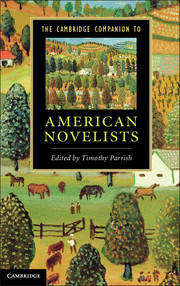Book contents
- Frontmatter
- Contents
- Contributors
- Introduction
- 1 James Fenimore Cooper
- 2 Nathaniel Hawthorne
- 3 Herman Melville
- 4 Harriet Beecher Stowe
- 5 Mark Twain
- 6 Henry James
- 7 Edith Wharton
- 8 Theodore Dreiser
- 9 Willa Cather
- 10 F. Scott Fitzgerald
- 11 Ernest Hemingway
- 12 William Faulkner
- 13 Henry Roth
- 14 Djuna Barnes
- 15 Zora Neale Hurston
- 16 Richard Wright
- 17 Raymond Chandler
- 18 Ralph Ellison
- 19 J. D. Salinger
- 20 Patricia Highsmith
- 21 Vladimir Nabokov
- 22 Jack Kerouac
- 23 Saul Bellow
- 24 Kurt Vonnegut
- 25 John Updike
- 26 Thomas Pynchon
- 27 Toni Morrison
- 28 Philip Roth
- 29 Don DeLillo
- 30 Cormac McCarthy
- Guide to Further Reading
- Index
- References
22 - Jack Kerouac
Published online by Cambridge University Press: 05 December 2012
- Frontmatter
- Contents
- Contributors
- Introduction
- 1 James Fenimore Cooper
- 2 Nathaniel Hawthorne
- 3 Herman Melville
- 4 Harriet Beecher Stowe
- 5 Mark Twain
- 6 Henry James
- 7 Edith Wharton
- 8 Theodore Dreiser
- 9 Willa Cather
- 10 F. Scott Fitzgerald
- 11 Ernest Hemingway
- 12 William Faulkner
- 13 Henry Roth
- 14 Djuna Barnes
- 15 Zora Neale Hurston
- 16 Richard Wright
- 17 Raymond Chandler
- 18 Ralph Ellison
- 19 J. D. Salinger
- 20 Patricia Highsmith
- 21 Vladimir Nabokov
- 22 Jack Kerouac
- 23 Saul Bellow
- 24 Kurt Vonnegut
- 25 John Updike
- 26 Thomas Pynchon
- 27 Toni Morrison
- 28 Philip Roth
- 29 Don DeLillo
- 30 Cormac McCarthy
- Guide to Further Reading
- Index
- References
Summary
“Sal, we gotta go and never stop going till we get there.”
“Where we going, man?”
“I don’t know, but we gotta go.”
Jack Kerouac, On the Road (1957)
One day before the publication of his first novel, TheTown and the City (1950), Jack Kerouac (1922–69) wrote in his journal about his newest work in progress: “How is a miserable hitch-hiking boy going to mean anything … to Howard Mumford Jones who wants everybody to be like him (middleclass, intellectual, ‘responsible’) before he will accept them?” (WW, 276). Kerouac was worried that the “road novel” he had begun to conceptualize in 1948 would be dismissed not only because it failed to foreground the normative cultural values reviewers praised in The Town and the City, but also because he knew that in order to represent an emergent, postwar type of American character the novel would deploy an unconventional, idiosyncratic narratological form (WW, 185). The year Harcourt Brace published The Town and the City, the United States took significant steps to enact cold war policies that established the normative ideological context to which Kerouac’s narratological experimentation would respond and against which his work would primarily be judged: President Truman ordered the production of the hydrogen bomb, authorized U.S. forces to defend South Korea, and enacted National Security Council Report 68 (NSC-68), the foundational document in U.S. cold war policy. Further, in February of 1950 Senator Joseph McCarthy (R-Wisconsin) rose to national prominence by claiming to possess a list of State Department employees who were also members of the Communist Party, a claim he could never substantiate.
- Type
- Chapter
- Information
- The Cambridge Companion to American Novelists , pp. 219 - 229Publisher: Cambridge University PressPrint publication year: 2012
References
- 1
- Cited by



